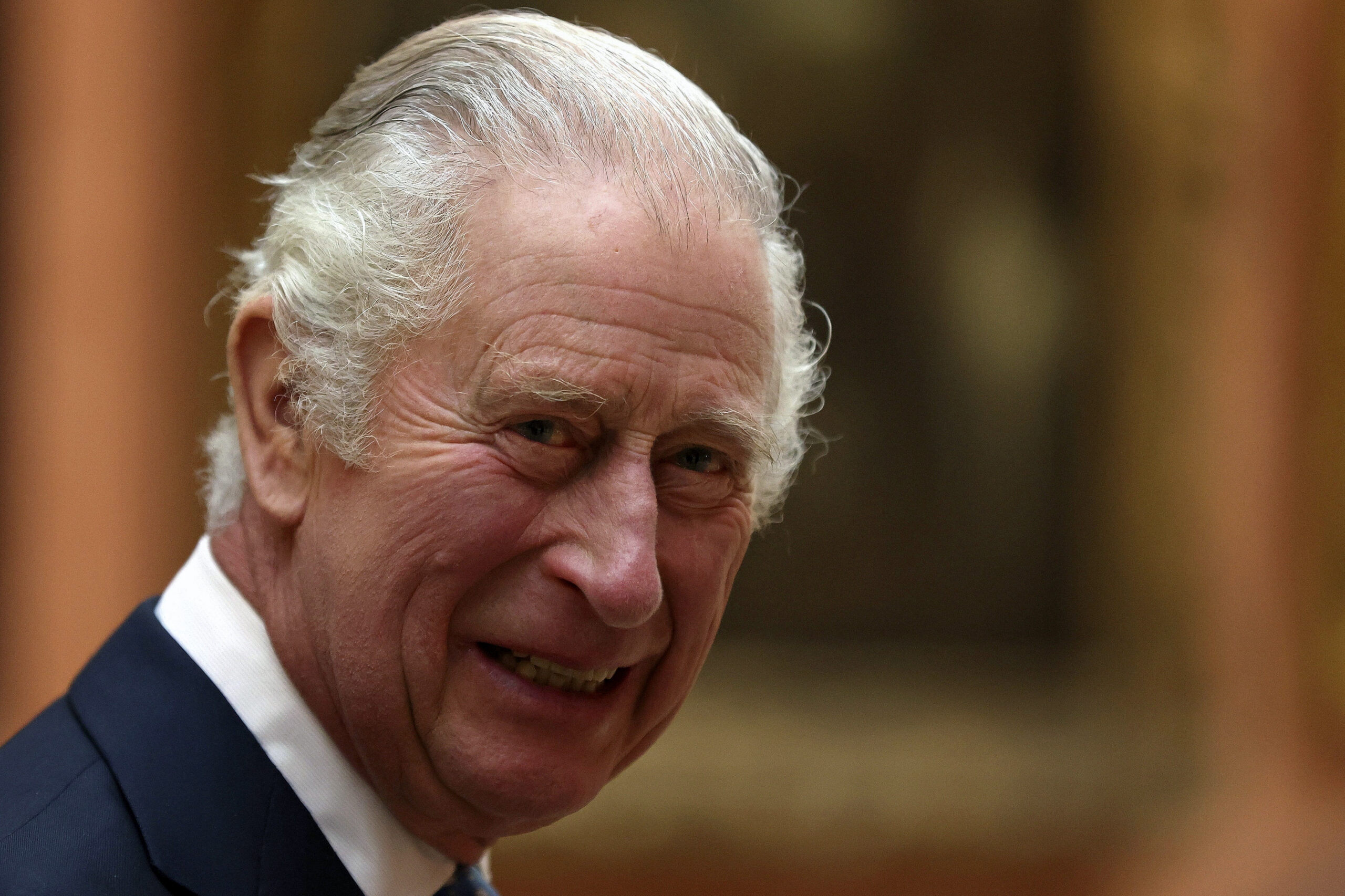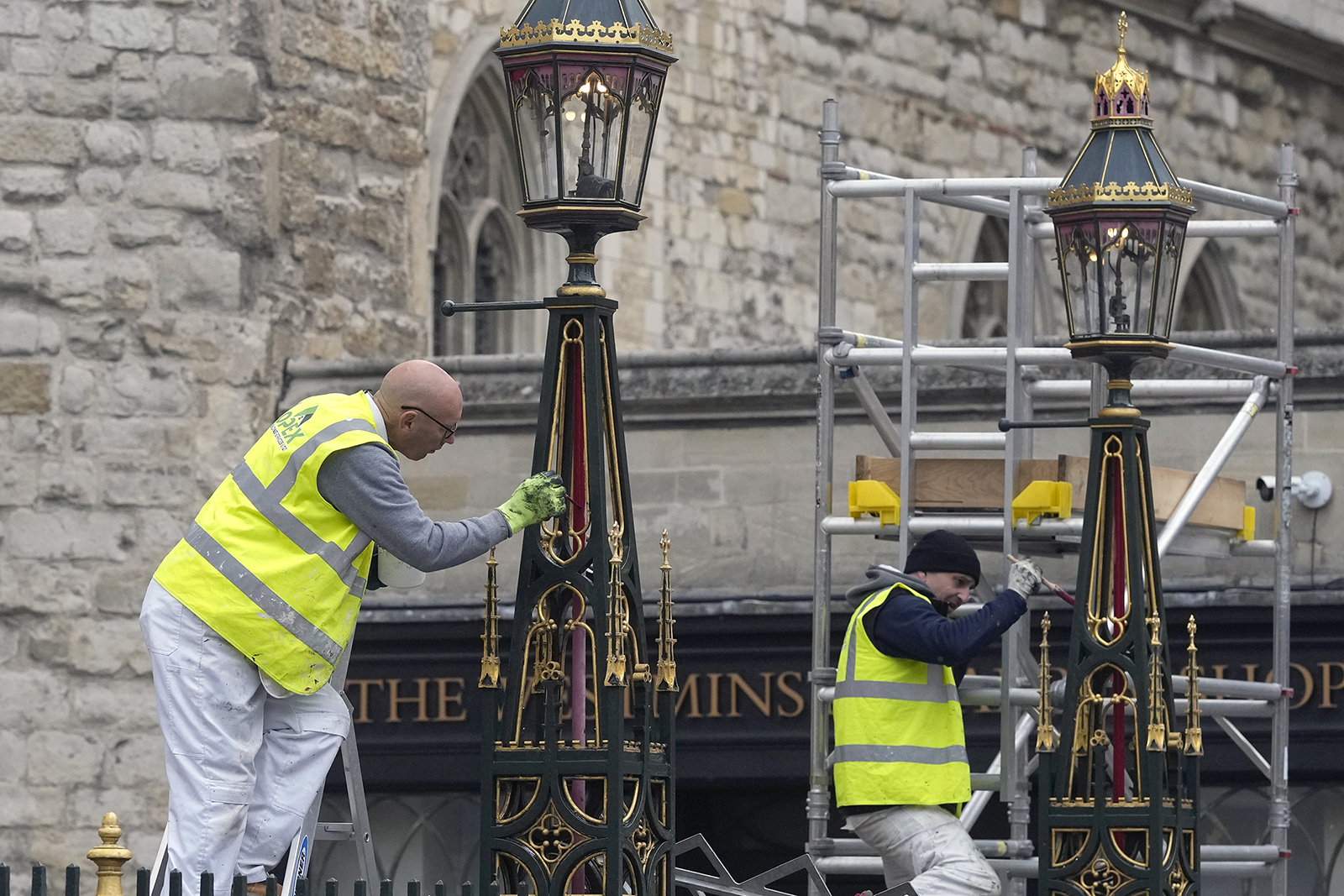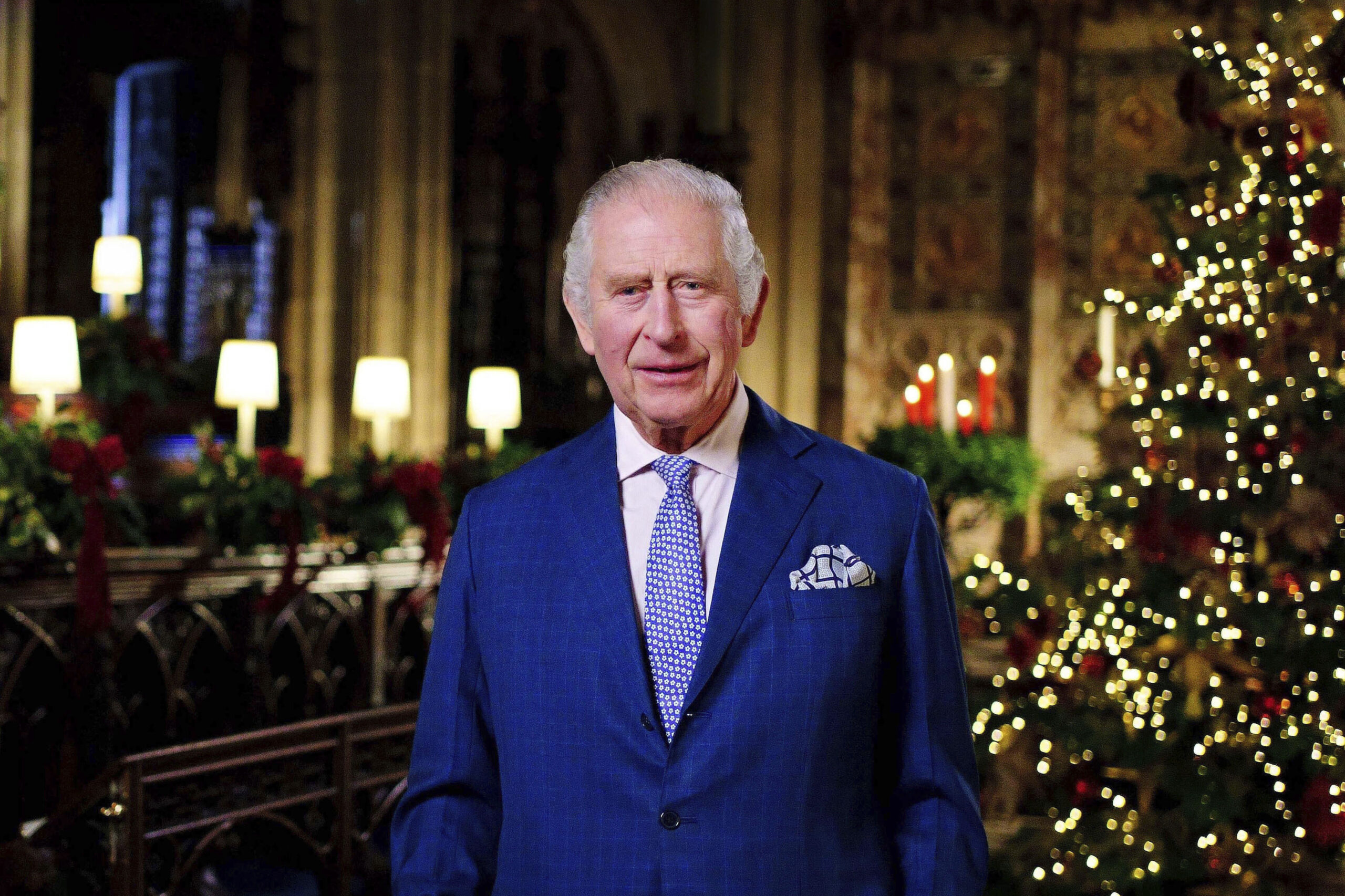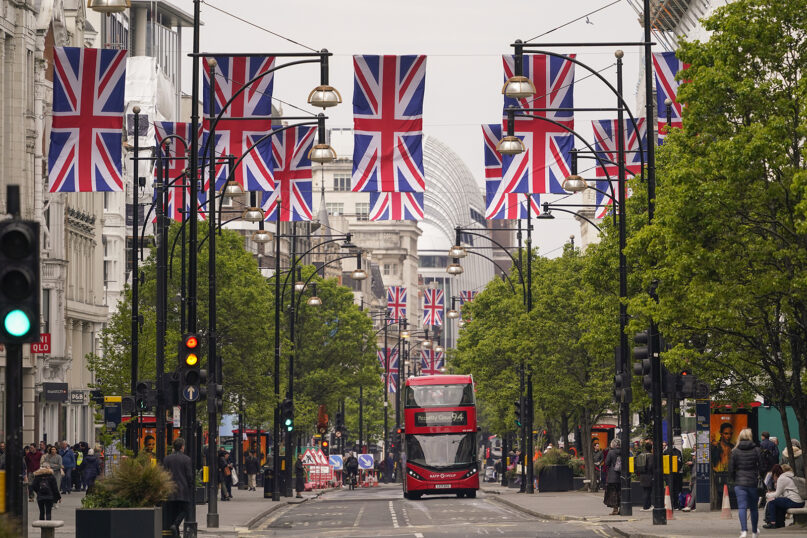LONDON (RNS) — On May 6, King Charles III will be crowned in Westminster Abbey in an ancient ceremony echoing biblical ideas of kingship and containing rituals that have been used since the first English king more than 1,000 years ago. But Charles will undergo the ceremony in an England unlike any other — different even from that of his mother, 70 years ago.
When Elizabeth II was crowned, Britain was still emerging from the hardships of World War II. Rationing of foodstuff and fuel was continuing. Cities were still ravaged by damage from German bombs, leaving housing in short supply. The nation was in need of cheering up.
The coronation of a young queen fit the bill. Elizabeth was just 27 on her Coronation Day, June 2, 1953. Besides the fresh start of a new monarch, the occasion offered the fizz of new technology: It was the first to be broadcast to a vast TV audience at home, in addition to the huge crowds on the streets.
Britain in 1953, though already changing, was still much more homogeneous, with far stronger links to Christianity and in particular the established Church of England. It is all so very different now, in the 21st century.
On March 21, 2021, the day of Britain’s decennial census, 1 in 6 residents, about 10 million people, reported they had been born outside the United Kingdom, up from 7.5 million in 2011. India is the most common country of birth of migrants, but significant numbers list Pakistan, Bangladesh, Nigeria, Jamaica and other former colonies, as well as former European Union partners such as Romania and Poland.

Britain’s King Charles III meets members of the Westend Gospel Choir after a ceremony commemorating the 50th anniversary of the Resettlement of British Asians from Uganda in the U.K., at Buckingham Palace in London on Nov. 2, 2022. (Isabel Infantes/Pool via AP, File)
The ethnic diversity is matched by changes in the country’s religious makeup. Just 46% said they were Christian on census day — a drop of 11 percentage points in 10 years. Meanwhile, other faiths, including Islam, Judaism, Hinduism and Sikhism, grew by 100,000 adherents in a decade.
But the most significant difference is the growth of those who said they have no religion — an increase of 8.5 million, bringing those with no faith to 22 million, or a third of the population.
Yet the coronation remains fundamentally a Church of England rite. The monarch, the Supreme Governor of the Church of England, is crowned by the Archbishop of Canterbury, that same church’s leading primate. This mutual endorsement has prevailed since 1534, when Henry VIII broke England away from the Roman Catholic Church and set up his own church. A few years earlier, the pope had settled on Henry the title of Defender of the Faith for his loyalty to Rome. Despite the split, all British monarchs, including Charles, have used it since.
The irony is that 500 years later, about twice as many Roman Catholics attend Mass, about a million, as Anglicans do Sunday services. Even if they balk as the king swears his oath to maintain the Protestant Reformed Religion, Catholics will have some familiarity with anointing with oils; the Anglican Holy Communion service, which is similar to the Catholic one; and the moments when God is asked to sustain the king in his duties, which is comparable to a priestly ordination.
For that sizable third of the population who have no religion, however, the coronation may be mystifying. Demystifying it will be the job of the media. British television companies and other broadcasters, magazines and newspapers are all priming themselves to explain it to an audience that does not have the religious literacy it once did.

Workers repaint the lampposts April 27, 2023, outside Westminster Abbey in London as preparations continue for the coronation of King Charles III. The ceremony will take place in Westminster Abbey, followed by a balcony appearance at Buckingham Palace, on May 6, 2023. (AP Photo/Alastair Grant)
But there is another, no less remarkable change in the religious orientation of the man being crowned. While confirming his own faith since his accession last September, King Charles has also made an effort to embrace Britons of other faiths and even none.
During his televised address to the nation the night after his mother’s death, he talked about his particular responsibility to the Church of England and described it as “the church in which my own faith is deeply rooted.” A week later, at a reception at Buckingham Palace for leaders of several faiths, he said, “I am a committed Anglican Christian and at my Coronation take an oath relating to the Settlement of the Church of England,” but he added that he had a duty as sovereign “to protect the diversity of our country, including by protecting the space for faith itself.”
He went on: “I hold myself bound to respect those who follow other spiritual paths, as well as those who seek to live their lives in accordance with secular ideals.”
In this the new king was following in his mother’s footsteps. Known for her own Christian faith as well as her public role as Supreme Governor of the Church of England, Elizabeth led the nation in prayer services of thanksgiving and commemorations for the war dead. Since the 1930s, British monarchs have spoken to the nation via the radio and, later, television on Christmas Day.
People remark on Elizabeth’s very personal reflections about her own Christian beliefs in later broadcasts, but in fact her very first Christmas broadcast, after her accession to the throne in 1952, was highly personal and faithful too. “I want to ask you all, whatever your religion may be, to pray for me on that day,” she said, “that God may give me wisdom and strength to carry out the solemn promises I will be making, and that I may faithfully serve Him and you, all the days of my life.”
It was a bold step from a queen in 1952. Interfaith dialogue was the not yet the norm, and the presumption was that she was asking for the prayers of her subjects of whatever faith. At her coronation six months later, it became evident quite how dominant Anglicanism remained when only one cleric from another Christian denomination, the Presbyterian Church of Scotland, was given a role in the ceremony, and a tiny one at that — he handed the queen the Bible on which she swore her oaths. No Roman Catholic was remotely present, let alone a Muslim, Jew or Hindu.

Britain’s King Charles III delivers his message during the recording of his first Christmas broadcast in the Quire of St. George’s Chapel at Windsor Castle, Berkshire, England, Dec. 13, 2022. Charles evoked memories of his late mother, Queen Elizabeth II, as he broadcast his first Christmas message as monarch on Dec. 25, 2022, in a speech that also paid tribute to the “selfless dedication” of Britain’s public service workers, many of whom are in a fight with the government over pay. (Victoria Jones/Pool Photo via AP)
Roll forward to 2022 and Charles’ first Christmas Day broadcast as monarch. After a tribute to his mother and her faith, and a reference to his visit to Bethlehem years earlier, he praised the number of churches, synagogues, mosques, temples and gurdwaras offering solidarity with those in need as “the most inspiring expression of loving our neighbour as ourself.” The citation is from Leviticus as well as the New Testament, but anyone within earshot undoubtedly registered an acknowledgment of Christian teaching.
But importantly, there was no mention of his coronation and no request for prayers. The king, who has long been engaged in interfaith dialogue, would have been acutely aware that while asking for prayers, as his mother did, could be interpreted as an inclusive act, it could also be seen as exclusive, especially to that third of the British who have no faith.
This difficult balancing act is evident in the planning for the coronation. It will be above all else an Anglican service, but there is growing evidence of efforts to make it more ecumenical. The holy oil the Archbishop of Canterbury will use to anoint the king, symbolizing God’s blessing coming down upon him, is made from olives grown close to where Charles’ paternal grandmother, Princess Alice of Greece, is buried, and was blessed by not only an Anglican bishop but a Greek Orthodox patriarch.
This is an innovation not seen before. In addition, the cross to be used in the coronation procession has embedded in it relics of the true cross, given by Pope Francis.
Of course, the coronation ritual is older than the Reformation, when England broke with Rome, and so is intrinsically Catholic. Still, it will be bracing to see a reliquary cross swaying over the introit of a service in which a monarch will swear to uphold a Protestant sect founded by Henry VIII, who ordered countless medieval shrines, including their relics, destroyed.
As the order of service has still not been published, quite what the role of other faiths will be is still not clear. Anglican canon law rules out prayers said by other faiths in Church of England churches; only a fortnight ago, Manchester Cathedral apologized after a Muslim call to prayer was chanted in its nave. But there is precedent for at least nominal involvement of other faiths, if only recent: Representatives of non-Anglican and non-Christian faiths processed in Westminster Abbey for Queen Elizabeth’s funeral. One option may be that faith leaders offer the king a greeting during the coronation.
The Church of England, meanwhile, has issued a book of prayers, asking people to pray each day between Easter and May 6 for the king, with reflections on different elements of the ceremony and explaining its symbolism. The book also encourages people to pray for the nation and the world. Its compilers might also have asked people to pray for the Church of England, an institution, no less than the monarchy, whose future will be the subject of much discussion on Coronation Day.
Catherine Pepinster is the author of “Defenders of the Faith: The British Monarchy, Religion and the Coronation.”





